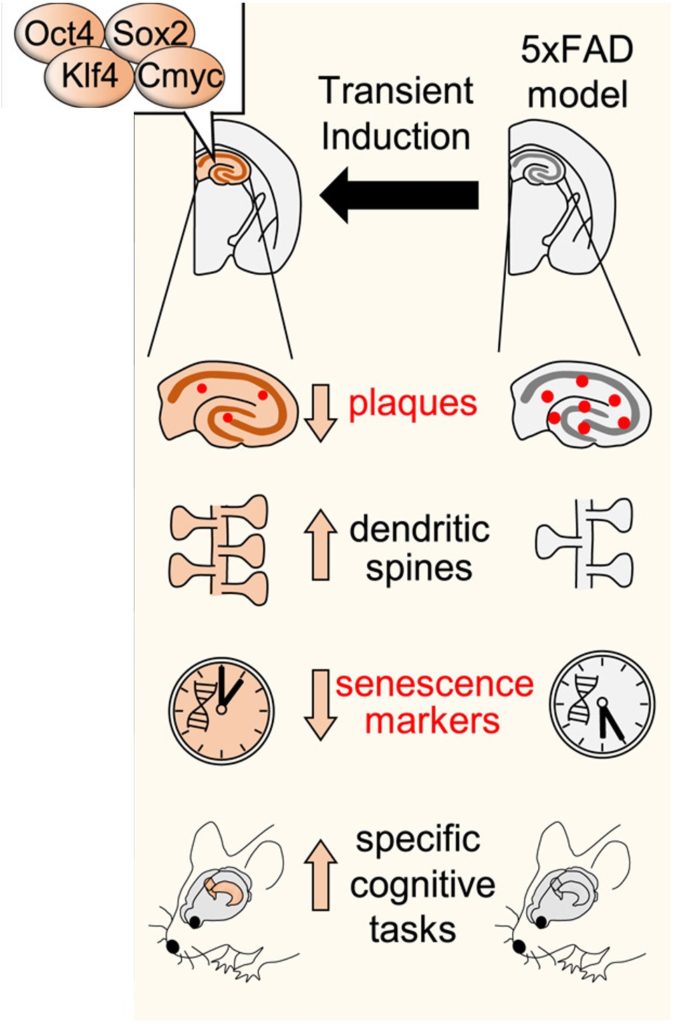Cellular Reprogramming Counteracts Accelerated Brain Aging
Scientists mitigate Alzheimer’s disease symptoms in a mouse model using a new age-reversal technology called cellular reprogramming.
Highlights:
- Cellular reprogramming technology reverts cells to an earlier stage of development, essentially making them younger.
- Cellular reprogramming increases the brain size of mice during development leading to improved brain function.
- Cellular reprogramming gene therapy mitigates symptoms of Alzheimer’s disease in a mouse model.
An international team of scientists from Germany, Spain, France, Taiwan, and the United Kingdom may have discovered the key to treating accelerated brain aging with a new technology called cellular reprogramming.
What Is Cellular Reprogramming?
Cellular reprogramming reverts cells to an earlier stage of development. This is done using four genes called Yamanaka factors, named after the Nobel prize-winning scientist Shinya Yamanaka. The Yamanaka factors were originally used to revert adult cells into stem cells. However, scientists have found that the transient activation of Yamanaka factors can make cells younger without turning them into stem cells.
Several studies have shown that cellular reprogramming prolongs the lifespan of mice and rejuvenates multiple organs and tissues. However, it remains unclear how cellular reprogramming affects the rejuvenation of the brain.
Cellular Reprogramming Rejuvenates the Brain
To determine how cellular reprogramming affects brain development, researchers employed genetically modified mice. With the magic of genetic manipulation, the researchers induced cellular reprogramming while the mice were still in the womb. As a result, the mice developed larger brains. Moreover, after the mice were born, they had better balance, were less compulsive, and were more sociable.
Considering the effect of cellular reprogramming on brain development and behavior, the researchers sought to determine how cellular reprogramming could alter brain aging. To do so, they injected Yamanaka factors into the brains of mice modeling Alzheimer’s disease (AD) — an accelerated brain aging disease. This led to the mitigation of several key indicators of AD and brain aging, including reduced amyloid-beta plaques, a hallmark of AD.
Cellular reprogramming gene therapy also increased the number of dendritic spines — the structures on neurons that receive signals from other neurons, allowing the brain to function via electrochemical signals. Moreover, cellular reprogramming reduced markers for senescent cells — cells that accumulate with age and contribute to disease.
Furthermore, the cellular reprogrammed AD mice performed better on various cognitive tasks. These tasks were designed to assess memory and cognitive flexibility (adapting to changing environments). However, cellular reprogramming had no effect on tasks designed to measure anxiety and depression, suggesting that cellular reprogramming mitigates the cognitive but not emotional deficits associated with AD.

Preventing Alzheimer’s
Cellular reprogramming therapy is an emerging science and is likely not to be tested on human brains in the near future. However, clinical trials for the use of cellular reprogramming on a rare eye disease may begin in the latter half of 2025. In the meantime, there are measures to be taken if willing to attempt prevention of accelerated brain aging and AD.
Diet and exercise are critical to preventing accelerated brain deterioration. Chronically eating in excess, as indicated by being overweight or obese, can lead to metabolic defects such as diabetes, which increases the risk of cardiovascular disease and dementia. Additionally, a sedentary lifestyle that excludes both cardiovascular and resistance exercises increases the risk of AD in a similar fashion.
Getting adequate, good-quality sleep can reduce the risk of AD. Moreover, having strong social connections and a sense of belonging is associated with the prevention of AD. Combined with diet and exercise, these factors can help to mitigate stress and the associated psychiatric disorders (e.g., depression and anxiety), which increase the risk of accelerated brain aging and AD. Stress can also be mitigated through various relaxation exercises, including meditation and prayer.
Another key factor that contributes to maintaining the health of the brain is using it. Engaging in cognitively demanding tasks (e.g., reading, writing, video games, analog games, educational attainment, learning a new language or instrument) can keep the mind sharp. Perhaps lesser known is the association between oral health and dementia. Not smoking or drinking will also help with keeping the brain healthy and functioning efficiently.
Nutrients that may protect against cognitive decline, dementia, and AD include omega-3 fatty acids, B vitamins, and NAD+ precursors like NMN (nicotinamide mononucleotide) and NR (nicotinamide riboside). While the science is still emerging, NAD+ precursors may help improve mitochondrial health, and mitochondrial dysfunction is now being more widely accepted as a root cause of AD.

